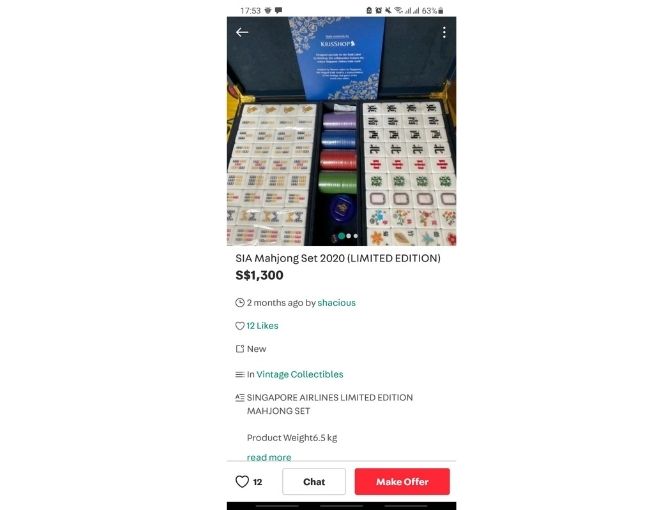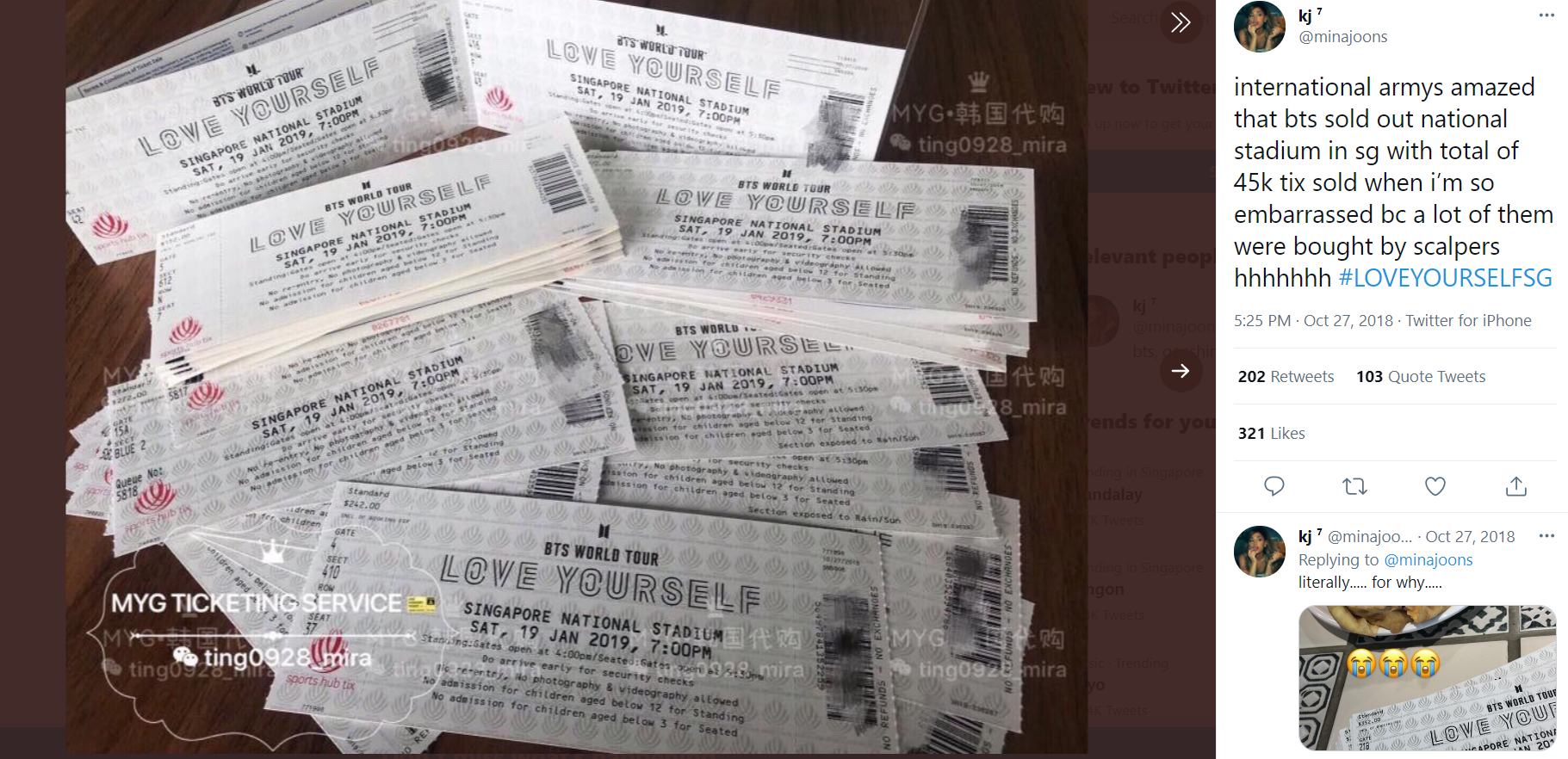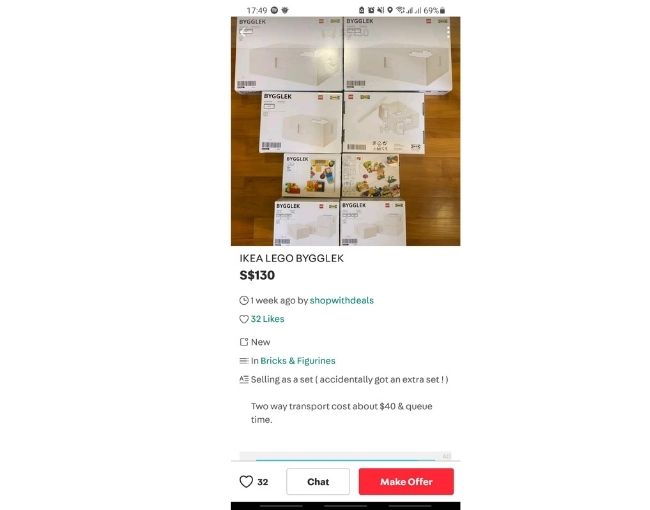What is the most you would pay for a highly coveted limited edition item? Perhaps a premium of 10 per cent? Maybe 20 per cent? Or perhaps you would even pay double the price?
Will you, however, be willing to part with an amount that is almost 400 per cent that of its retail price?
Well, some resellers on Carousell, an online marketplace, believe so, as they are listing the limited edition Singapore Airlines mahjong tiles for up to S$1,300, a 380 per cent premium on the S$338 set.

It is not just mahjong tiles either. Anything flies, from concert tickets to sneakers, and bizarrely, badminton court bookings.
When it comes to the practice of scalping, anything is fair game, as long as there is money to be made.
What exactly is scalping?
No, we are not talking about ripping off your scalp or stock scalping. Rather, it refers to the practice of purchasing items that are in high demand and low supply, and reselling them for (often an exorbitant) profit.
There is a distinction between scalping and mere reselling. While no universal definition exists, redditor u/CrinerBoyz provides a fairly clear explanation for the two.
According to u/CrinerBoyz, reselling is “a blanket term for anything that’s sold again after the original purchase from retail.” This can come in various forms, including selling off used items that are no longer needed, selling off stock purchased from elsewhere, and so on. Meanwhile, scalping is a subset of this larger phenomenon.
More specifically, scalping (as defined by u/CrinerBoyz) refers to the behaviour of purchasing “high-demand, low-supply [items] with the sole intention of taking advantage of this market deficiency to make a profit.”
Essentially, scalpers capitalise on product shortages to drive up prices, banking on consumers who deeply desire an item and will be inclined to fork out a larger sum for an item they may otherwise have no means of getting.

We have often seen examples of this in Singapore and across the world, whether it is for gaming consoles, like the PlayStation 5 when it was first released, SIA mahjong tiles, concert tickets, or even bubble tea when the Circuit Breaker forced bubble tea shops to shut in Singapore.
Seems like simple market economics? On the surface it is, but scalping is generally seen as unethical, and scalpers have drawn much flak over the years.
READ: What Do We Lose When We Stop Speaking a Language?
Why is scalping unethical?
Purchasing an item and selling it for profit on its own is not unethical, but it is the way scalpers approach this that is questionable.
Take concert tickets. When popular Korean boy band BTS was slated to come to Singapore for their Love Yourself concert in 2018, the 50,000 tickets available were snapped up in under four hours. While this might have been indicative of the idol group’s popularity, the hours after revealed a larger problem at hand.

Tickets to the Love Yourself concert started appearing on ticket exchange sites like StubHub, but with outrageous price tags of up to S$12,888, when the retail price for CAT 1 ticket was only S$348. That is a whopping 37x increase on the original price!
Pictures also began to surface online of scalpers who have secured whole stacks of tickets for the sole purpose of reselling them for profit.
These bulk purchases artificially bolster demand for a product, causing prices to skyrocket for sincere fans who wish to attend these concerts. Moreover, the extra profit only benefits the scalpers. The organisers, artists, or anyone involved in the production of the concert do not receive a cut.
To make matters worse, many of these scalpers pull off such bulk purchases through the use of bots, which enable them to enter online queues thousands of times, preventing customers who are serious about attending these concerts from getting their hands on tickets.
READ: Time to Talk Money with Money Talks
Scalping and price gouging during a pandemic
The practice of scalping is not so different from that of price gouging, defined by the Harvard Business School as a practice whereby companies “raise prices to unfair levels.”
According to Harvard Business School, price gouging typically happens when there is a spike in demand for a good or service, usually during a natural disaster or an emergency.

Sounds familiar? Well, price gouging and scalping practices both came to light during the COVID-19 pandemic. As Singapore struggled to secure personal care products, such as face masks, thermometers, and hand sanitisers, retailers and online resellers leveraged on the desperation of consumers and shortage in the supply chain to increase prices exponentially.
Understandably, the Government did not stand for such practices when it comes at the expense of public health.
During the initial months of the pandemic before supply for personal care products stabilised, the Ministry of Trade and Industry (MTI) stepped in under the Price Control Act to monitor and moderate the prices of these products.
Is scalping illegal then?
On its own, the simple answer is no.
But, the Government does have measures in place that allow it to step in when necessary, as they did during the pandemic.
According to Singapore’s Price Control Act, the Government is able to, in certain situations, fix maximum prices or dictate the manner in which maximum prices are set of any good, secondhand or otherwise.
When MTI stepped in during the pandemic, letters of demand were issued to retailers and e-commerce platforms requiring them to provide information on factors, such as cost price and profit margins. Those who failed to comply could have been fined up to S$10,000 for the first offence, and up to S$20,000 for the second and subsequent offences.
MTI does not make it a habit to intervene in the free market when public health is not an emergent threat.

Minister of Trade and Industry Chan Chun Sing says that the Government should not prescribe profit margins for ticket resales: “The margin which resellers can command is freely determined between willing buyers and sellers. This means that the resale price can end up being higher or lower than the original price.”
Still, ticket organisers do their part to prevent scalping by introducing terms and conditions that prohibit the reselling of tickets. For instance, they have been known to void tickets that were found to be on sale on platforms like Carousell, or even going as far as to permanently ban those who are found to be reselling tickets.
Even so, trying to eliminate the practice of scalping without legal recourse is a tall order, and it seems that this practice might be here to stay.
How to avoid and prevent scalping?

Ultimately, the market is driven by supply and demand.
If demand for scalped tickets and products fall, scalpers will lose their incentive to purchase and resell these items for marked up prices as well. Over time, this will allow prices to moderate to more reasonable levels. The best way to prevent scalping behaviour is to simply stop purchasing from them.
To avoid the pitfalls of scalpers online, be sure to carefully check any terms and conditions before making your purchase. If you suspect unfair trading practices or fraud, you can also approach the Consumers Association of Singapore for assistance.
READ: Esport tournament Dota 2 in October may be attended only by highest ticket bidders
Join the conversations on THG’s Facebook and Instagram, and get the latest updates via Telegram.














